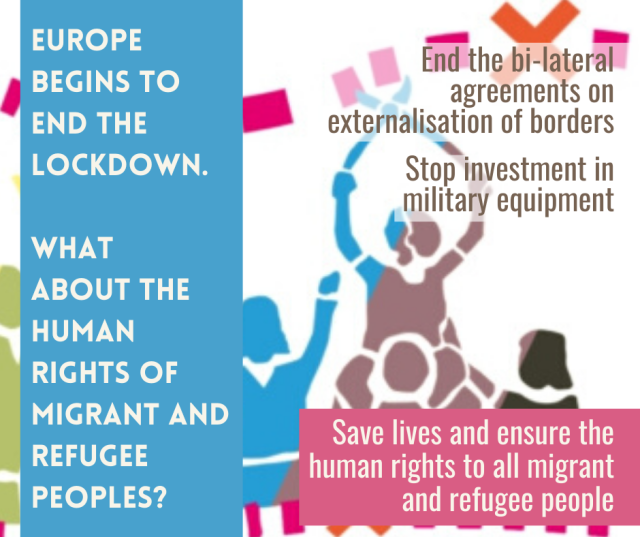One after another the countries of the European Union (EU) are starting to end the so-called Lockdown, after long weeks of quarantine imposed by the coronavirus crisis, Europe’s inhabitants are trying to resume the rhythm of a normal life, albeit slowly. However, for migrant and refugee peoples, the crisis is far from over. Thousands remain locked up in camps, unhealthy settlements, or survive in precarity, on the margins, threatened by racism, fear and repression.
The situation in Lesbos, Greece, where more than 30 000 migrants and refugees are surviving, is the most terrible scenario of the daily violation of human rights by a state and the European Union, which, by failing to provide the necessary assistance to people whose lives are in danger, are guilty of a crime against the population. The decision by some governments to receive, on a trickle by trickle basis, some minors and women from Lesbos, should not hide from us the dimension of the human tragedy experienced by the undocumented.
The thousands of workers confined to precarious settlements in Andalusia, southern France or some regions in Italy among others, without food or basic health services, are another bleeding wound that the pandemic has further aggravated. At the same time, especially in the cities, many migrant women who work as domestic workers have lost their jobs and income in this pandemic. Since they are undocumented, they cannot access government benefits or services, and similar to many migrant and refugee single parents and children, they are in high risk of being or becoming homeless and are therefore also more exposed to the threat of Covid-19.
The coronavirus pandemic has produced a multifaceted crisis of incalculable dimensions. It is a health, economic, social and humanitarian crisis. And above all, a crisis of this capitalist system, producing and generating exploitation towards the most vulnerable populations, in particular migrant and refugee peoples.
To confront the crisis, several governments have not hesitated to resort to warlike language or to vulgar patriotism and nationalism calling for "unity of the fatherland", and "closing the borders" and continuing to invest in the militarization of migration policies. We protest the fact that health measures, necessary to combat the pandemic, are used to stigmatize, discriminate or violate the human rights of migrant communities and peoples who are now stranded, locked in a kind of limbo where they cannot circulate, return to their countries of origin, or meet their families. This strategy is being used to, once again, prevent rescues in the Mediterranean by refusing to allow disembarkation. The two civilian rescue vessels Alan Kurdi and Aita Mari have been immobilised by Italian authorities in the port of Palermo on 5th and 6 of May, after they had saved about 183 persons, thus preventing the ships to go back to sea and resume rescue operations. The Permanent Peoples’ Tribunal (PPT) judgement in Palermo in 2018 declared these prohibitions of rescue “as crimes against humanity in the Mediterranean” and also recently warned that, "nationalist blindness can have more devastating effects than a pandemic".
Invisibilized by xenophobic and discriminatory policies, migrant and refugee peoples have once again demonstrated their importance to society when they are required to carry out activities such as agriculture, cleaning, care work, and food distribution, most often without any protection, and without recognition of their rights.
Among the countries that make up the European Union, only Portugal allowed the documentation of migrants who, before the onset of the coronavirus crisis, had begun the process of applying for regularization with the objective that they could access health and social services. In the other countries, when the government took measures to provide ‘papers’ this was done with the aim of having labour available in agriculture, forestry, cleaning and sanitation services, and not prioritising or ensuring respect and protection of people’s basic rights.
A generalised and comprehensive regrisation of all migrant and refugee peoples in the EU is essential and urgent so that they can finally exercise their labour, social and health rights properly, for their own benefit and that of society as a whole.
The crisis of the coronavirus has left thousands dead in Europe, but it has also seen the birth of new solidarities, from below, between and towards the most discriminated, those "no-bodies" who in all countries have emerged to confront the most serious challenge to humanity in many years. We have also seen that States can, when they choose, invest millions of euros to save corporations, jobs and human lives. We call on EU governments, to end their bi-lateral agreements on externalisation of borders (with Libya, Turkey, Morocco, etc.) where push-backs are leading to arbitrary arrests and abuse and indiscriminate repression. We also demand to stop its investments in military equipment. Instead, it is urgently needed that the EU and its member states resume responsibility to save lives and ensure the exercise of human rights to all migrant and refugee people. Instead, it is urgently needed that the EU and its member states resume responsibility to save lives and ensure the exercise of human rights to all migrant and refugee people.
It is obvious that the revival of our societies, if we are to avoid another crisis as serious, or even more serious than the current coronavirus pandemic, cannot continue to deny the rights of those millions of people who make up the migrant and refugee communities and peoples.
May 14, 2020




